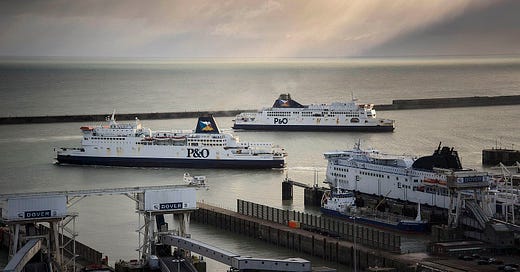DP World: UK Minister told not to talk about P&O sackings
New: As Starmer rebukes transport secretary for calling ferry firm ‘rogue operator’, we have documents that show previous minister was instructed to avoid discussing sacked workers with DP World
Bill Clinton’s advisor James Carville famously said that when he died, he wanted to be reincarnated as the bond market, because then he could intimidate everyone.
Looking at the headlines over the past 24 hours, maybe Carville should consider being reincarnated as DP World.
The Dubai-based logistics giant - which owns P&O Ferries - certainly seems to have put the wind up Keir Starmer.
On Saturday, the prime minister upbraided transport minister Louise Haigh for saying she had boycotted “rogue operator” P&O after it cancelled the contracts of 800 ferry workers over Zoom in 2022 - a move which sparked protests by trade unions and politicians of all sides.
Starmer’s public rebuke came after a Financial Times report that DP World was postponing plans to invest £1 billion in London’s main port in the wake of Haigh’s comments.
Now documents released to this newsletter suggest that the U.K. government is so wary of offending DP World that ministers have been told not even to mention the P&O controversy when meeting the firm.
In February 2023 Conservative investment minister Lord Dominic Johnson met DP World’s chairman and chief executive officer Sultan Ahmed Bin Sulayem. It was the first meeting between the UK government and the company since the P&O debacle - so you’d expect some discussion of it?
You’d be wrong.
In an official briefing prepared ahead of the meeting the minister was advised that discussing the P&O sackings should be avoided. “We have been told they will not raise this, do not proactively raise,” stated the briefing, which was released following a Freedom of Information request by Democracy for Sale. (Documents attached below.)
If P&O did come up in conversation Johnson was told to say that HMG is committed to workers rights but also "we are committed to our relationship with DP World and would like to look forward".
Screengrab of briefing for Lord Johnson ahead of meeting with DP World, Feb 2023
The briefing described DP World as “major investors in the UK through the London Gateway and are a key partner in the delivery of the Thames Freeport” and suggested Johnson tell the Dubai company that he was “confident” that “DP World will be economic beneficiaries of the Freeport’s project.”
But what exactly Johnson and Middle East Trade Commissioner Simon Penny said to DP World last year is unclear - the minutes of the meeting were *so* heavily redacted that all we know is Sultan Ahmed Bin Sulayem thanked the minister for the government granting the freeport license.
Sky News is now reporting that DP World’s £1 billion investment is back on and that chairman Bin Sulayem will attend the UK government’s international investment summit tomorrow (Monday).
One group who definitely won’t be at Starmer’s flagship summit are Dubai trade unions. Collectively bargaining is banned in the United Arab Emirates.
Last March, a month after Lord Johnson met DP World, a UAE trade minister warned the UK not to speak up about workers’ rights if it wanted to strike trade deals in the Middle East.






Love that Carville quotation. Several of our neighbours here in Northern Ireland have worked for P&O in various capacities over many years. Anecdotally, they run a dangerously run down ferry service. One of them, a maritime engineer even refusing to travel on their ships. So they had form in cutting corners to boost profits even before their vile sacking and rehiring fiasco. Which, by the way, has had the effect of seriously destroying the DUP’s voting base around here. For which we are actually extremely grateful. Clouds and silver linings 🐈⬛
These Freeports (and Special Economic Zones) are solely for the benefit of corporations and are detrimental to citizens. They are corporate fiefdoms that benefit from state aid and tax exemptions. As such, they are a barrier to rejoining the EU. They present a risk of reduced workers rights and also the compulsory purchase of people’s homes.